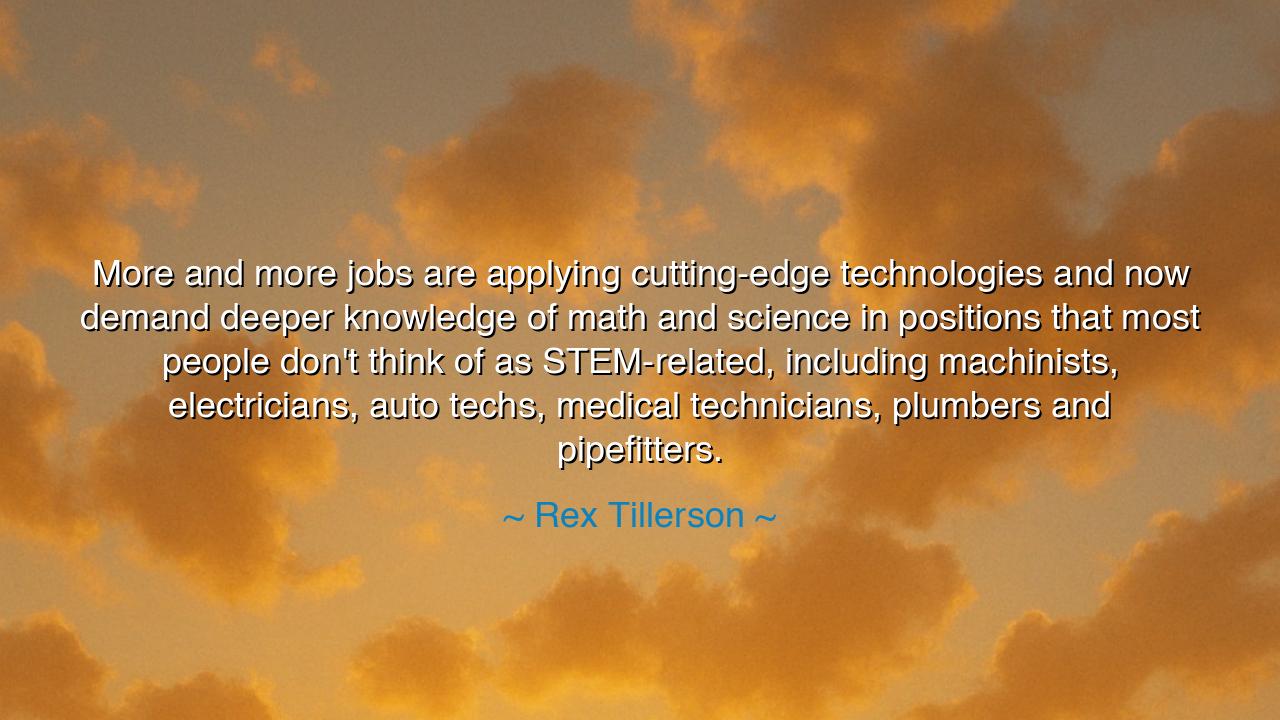
More and more jobs are applying cutting-edge technologies and now
More and more jobs are applying cutting-edge technologies and now demand deeper knowledge of math and science in positions that most people don't think of as STEM-related, including machinists, electricians, auto techs, medical technicians, plumbers and pipefitters.






The words of Rex Tillerson ring with both wisdom and warning: “More and more jobs are applying cutting-edge technologies and now demand deeper knowledge of math and science in positions that most people don’t think of as STEM-related, including machinists, electricians, auto techs, medical technicians, plumbers, and pipefitters.” In this declaration, Tillerson speaks not merely of labor, but of transformation—the shifting tide of civilization itself. His voice calls to a generation standing at the threshold of a new age, where the boundaries between the hands that build and the minds that calculate are dissolving, and where the worker and the scholar must become one.
In ages past, knowledge and craft were seen as separate realms: the philosopher in his study, the craftsman at his forge, the healer in her garden, each tending their own art. But as the centuries unfolded, invention began to weave them together. The Industrial Revolution first blurred these lines; the Digital Age has now erased them. Tillerson’s quote arises from this modern convergence, where the machinist now reads digital blueprints, where the electrician configures smart grids, and where the auto technician diagnoses engines through computer systems rather than tools alone. The world has become a great workshop of intellect and innovation, and those who once worked with steel and soil must now also work with code and data.
In his recognition of this change, Tillerson honors the dignity of labor and the evolution of mastery. The plumber who now uses sensors to detect hidden leaks, the pipefitter who reads precise digital measurements, and the medical technician who interprets complex diagnostic systems—all are heirs to an ancient lineage of ingenuity. They are not merely workers of the hand, but thinkers of the mind. Their labor reflects the same curiosity that drove Archimedes to study the movement of water and Da Vinci to blend art with engineering. The old division between “manual” and “intellectual” work is an illusion now fading before the light of progress.
There is a story from the early 20th century that embodies this truth. When Henry Ford revolutionized the factory line, he did not simply speed production—he transformed the relationship between worker and machine. At first, men feared that automation would replace them. Yet, over time, those who learned to understand the machines became their masters, not their servants. Mechanics became engineers, toolmakers became innovators, and the spirit of curiosity once reserved for scholars found a home in the hands of ordinary workers. Tillerson’s quote is the echo of that same awakening: that in a world driven by cutting-edge technologies, every laborer must also be a learner.
Yet this evolution demands humility and courage. Many resist the rising tide of change, clinging to the comfort of what once was. But the ancients would remind us that those who resist the flow of the river are carried away by its current, while those who learn to swim become its navigators. The knowledge of math and science, once confined to universities, is now the language of survival in every trade. To refuse to learn is to choose decline; to embrace learning is to claim one’s place in the new age. In this, Tillerson’s warning becomes a call to action: that the education of the future must reach every workshop, every job site, every community—so that the wisdom of the few becomes the strength of the many.
There is also reverence in his message, for he names professions that have long been the backbone of society—the machinists, plumbers, pipefitters, and electricians. These are not the lofty figures of boardrooms or laboratories, but the builders of nations, the quiet engineers of daily life. By including them among the practitioners of science and technology, Tillerson restores to them their rightful honor. For the universe does not divide wisdom by title; the same principles that govern the stars guide the turning of a wrench, the flowing of a circuit, and the healing of a patient. The divine symmetry of knowledge belongs to all who seek to understand.
And so, my child of learning and labor, take from these words a sacred charge: never cease to learn, no matter your path. Whether your hands hold tools or instruments, whether your work lies in fields or factories, remember that wisdom is not the privilege of the few—it is the duty of all. Seek the math that underlies your craft, the science that animates your tools, the technology that expands your reach. For to learn is to grow, and to grow is to serve.
In the end, Rex Tillerson’s words are not merely about jobs or technologies, but about the rebirth of the human spirit in an age of transformation. They remind us that the future belongs to those who can blend intellect with action, thought with labor, precision with purpose. The new craftsman, the modern worker, the evolving citizen—they are all heirs to a single truth: that progress is not built by machines, but by minds that dare to understand them. So let us labor not only with our hands, but with our hearts and our intellects, for in doing so, we become not just workers—but creators in the endless workshop of humanity.






AAdministratorAdministrator
Welcome, honored guests. Please leave a comment, we will respond soon